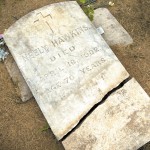La. descendants of slaves owned by Georgetown University meet to preserve history of their ancestors
3rd April 2017 · 0 Comments
By Charmaine Jackson
Contributing Writer
In 1838, Jesuit priests from one of the nation’s most elite Catholic universities sold 272 men, women, and children to slave owners in Louisiana, all in the name of preventing its demise. Today, Georgetown University has an endowment of more than $1 billion. It also has a historical credit for its involvement in the legacy of slavery.
The descendants of those slaves, along with scholars and a professional genealogist met during “A Gathering of Descendants” at Immaculate Heart of Mary Catholic Church Center in a small Louisiana town called Manringouin, approximately forty minutes from Baton Rouge. The meeting was organized by Delores Johnson, Katherine Jackson, and Mary Williams-Wagner, three alliance members of GU272, a group dedicated to honoring and preserving the history of the 272 slaves sold to work on Louisiana plantations in Iberville and Ascension parishes.

In this June 30, 2016 photo, the gravestone of Cornelius “Neely” Hawkins, one of the slaves in Georgetown University’s 1838 slave sale, is seen in Immaculate Heart of Mary Catholic Cemetery in Maringouin, La.
Katherine Jackson, a native of the New Orleans area, said planning for the event began last December when she and two other organizers shared a conference call with a group of GU272 descendants. She said the call “aimed at identifying the concerns and expectations of the descendants as related to Georgetown University’s role in the sale of their ancestors.”
“Almost immediately it became evident that we needed to identify and reach out to as many descendants as possible. Because Maringouin remains so central to this story, we chose that town as the location for our event, and then moved forward with planning via regular conference calls,” Jackson stated.
Maringouin is where a large group of the GU272 descendants reside today.
“During that first conference call, I was excited to learn that one of the primary goals of this group, now known as “The Legacy of the GU272 Alliance,’ would be to preserve the legacy of our ancestors. They sought to insure that this story of the sale of 272 enslaved Africans by Georgetown University would remain “our story,” [and] that the sufferings and horrors that our forefathers must have endured would be acknowledged and remembered,” Jackson said.
“One other major goal was to identify and engage as many GU272 descendants as possible thus providing a means by which they as a community can communicate their concerns to the officials of Georgetown,” Jackson added.
With more than 120 attendees present, Adjoa A. Aiyetoro, Professor Emeritus of the University of Arkansas at Little Rock; Adam Rothman, history professor of Georgetown University; and Judy Riffel, professional genealogist shared a wealth of information regarding the history of GU272 and the West Oak Plantation, GU272 genealogy, and discussed reparations and ways the university should honor the GU272.
Louisiana State University’s Dean of Ogden Honors College, Dr. Jonathon Earle, along with the T. Harry Williams Center For Oral History director, Jennifer Abraham Cramer located on LSU’s campus, provided an overview of a class offered that provides an introduction to GU272 and links histories of Georgetown and Louisiana, titled: “272 Slaves: Discovering Louisiana’s Past.”
After the program, descendants connected with one another by sharing memories through oral histories.
“When the story of the GU272 broke I realized right away that members of my own family must have been a part to this historic event. As more information came forth I was able to connect to my ancestors three, four and five generations back like never before. I am involved with this organization because I wish to honor their horrendous journey,” Jackson said.
This article originally published in the April 3, 2017 print edition of The Louisiana Weekly newspaper.



